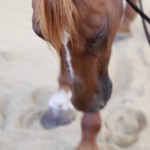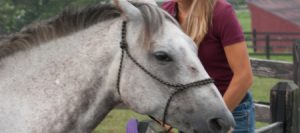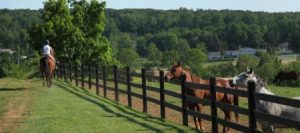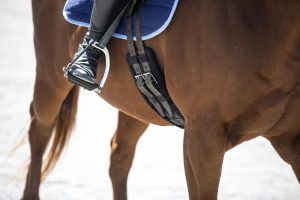Pawing is one of those things horses do that, to a non-horse person, may appear funny or cute. But to most of us it is an irritating and destructive behavior.
Why do horses paw? There are three main reasons: emotion, investigation, or as a learned behavior. It’s important to know why your horse is pawing as we will react differently depending on the cause.
In this video, learn why horse’s paw, and how we stop the pawing.














30 Responses
This goes right back to your “Stabling” video: “boredom” and “waiting for you to come around with the feed bucket” do not happen to a horse grazing all day in pasture!
I have 4 rescue yearlings our on pasture 24/7 , as they are young I give them a nutritional supplement feed out in their pasture & they all paw the ground. They have individual feed buckets that are not on the ground as they kept knocking them over & wasting food. I think it’s excitement maybe? I have also starting clicker training which they love & they do not mug however when I’m not training them but just walk near their fence or into their fields they come to me & paw the ground. Not in an aggressive way but a begging/frustration type way. The vets has checked & they are all in great health & condition. I’ve never rewarded them for pawing & just walk away instead but yet they still do it. Any suggestions?
I adopted a rescued Arabian (formerly abused, neglected & starved); she paws
(1) while awaiting her hay & grain feedings – I halt the “giving the feed process” each time – but, currently, she only stops briefly (I have more work to do in redirecting her – like & will try the “play with ball” alternative ;
(2) while seeing her stall neighbor & other geldings in the turn-out arena across from her stall – sadly, I can only redirect her by taking her out of her stall & walking her in the common areas adjacent to that arena when I am at the stable (only horses belonging to the same boarder get put into this rather small turn-out arena together). Do you have any alternative suggestion to reduce this particular pawing?
You mentioned an additional video on how to stop your horse from pawing regarding feeding time. Teach them to play with a ball. I am unable to locate it. Please let me know where to look.
Hi Callie,
So, we moved off grid across a river that seasonally requires horses to cross. Last year, we relied on our ranch workers to bring horses across and ferry us back. This year, we have our own horses…and are trying to learn to ride them! My horse Guaco started pawing the water part way across…our worker said “no Bueno”…and held on to him, talking to him and patting his head. Now I’m spooked to try by myself. Any suggestions?
Great video…I have a horse that recently started pawing while in the trailer. He never had a problem before but I don’t think he liked going riding at this location and when I would load him he would stand nicely until we would start to move out. I tried slowing down and that made it worse. Any suggestions>. Thanks Callie
Caitie, My horse paws while in trailer too. Bangs against the wall in front of her – it is padded with thick rubber, but she does it while moving slow or at stop light etc. Seems like an anxious or nervous habit. Suggestions? As a note, she used to paw while waiting for me to bring her feed in the paddock. (To clarify, my mare is out grazing all day, and only put in paddock at night so it’s not like she is overly hungry or dependent on the small amount of feed.) I began stopping in my tracks immediately when she started pawing – I would stand with the bucket patiently until the second she stopped then I would proceed in with the bucket – rewarding the stop – it has totally eliminated the pawing while at her feed bucket! And seems to have lessened the pawing while tied at the trailer, but she still bangs away while in the trailer.
If I am in a moving trailer, I usually can tell my mare is pawing when we are stopped at a light. I lift my foot off the brake and creep forward and then stop suddenly, This has lessened the pawing while traveling but does not stop it when she is impatient to be unloaded from the trailer quickly. Probably due to the fact that I am trying to save the trailer so I get her out as soon as possible thereby rewarding it.
Good video. Perhaps we all need to think about horses getting too hungry and the feeding schedule that humans have set up for horses based on human convenience rather than the horse’s needs. Having worked in many barns, the incidence of pawing, anxious whinnying, (and colic) has been demonstrated most frequently in barns that feed only twice a day so the horse spends the majority of the time with no forage available and has a very empty stomach most of the time, thus stressed. Many of the emotional behaviors associated at feed time can be eliminated by either trickle feeding, or providing more forage. Unfortunately, many barns stick to a rather strict 2x a day feed schedule, with no attention paid to the proportion of feed/forage needed as 1.5 to 2% of the horse’s ideal body weight. You don’t usually see pawing behaviors in horses that are on pasture, and can eat at a leisurely rate, on their own time frame.
Carol, I agree with your comment on feeding frequency & “times chosen for human convenience”! Luckily, our stable feeds 3x a day: breakfast at 6 am, lunch at noon and dinner at 5pm — but since my rescued Arab was formerly starved, I fill & have hay nets ready for her breakfast & dinner and , am there to feed her grains at noon. I tried the redirect of “play with the ball” at today’s lunch & dinner feedings – and it took her 5 seconds to learn & earn the click & clicker reward; smart Arab!! Thus, I can daily consistently redirect her at lunch & dinner. I know better to than to ask any of the “6am resident feed volunteers” to redirect my Arab while 30 other horses are pawing & calling to get their feed and, I can’t “dash out to the stable” at 6 am too since I am there daily from 10 am – 7 or 9pm! But, stopping her pawing twice daily will be a hugh improvement !!
Great video.
Trailer pawing and pawing while waiting for other riders to go on pm the trail .
What redirected behaviors do you recommend ?
Thanks Tere
Trailer pawing is likely due to anxiety or frustration. I would try to change the emotion, perhaps provide a haybag or another distraction. I wasn’t sure what you meant by the trail ride question?
Thanks Callie,
When other riders are on the trail and come to a water crossing and horse crossing is balky . While waiting … The horse I’m on begins to paw and won’t stand quiet . What do you do especially if trail is narrow and other horses are behind me .?
Hi Callie,
Thank you for this video! How is pawing destructive?
Hi Chris, pawing can dig holes in stalls or arena footing, or can mark walls or barn aisle floors.
Not only that but it can turn into stomping. My daughter got stomped on and now is on crutches for a while. It’s very important to do something about pawing!
Hi Callie,
I enjoyed your video; thank you. I have a horse that doesn’t paw or misbehave waiting for feed. He is on pasture during the day; he is outside 24/7 with overhang shelter and paddock dividing gait to close and keep the two horses separated, if needed, while they are eating; and he has a slow-feed hay bag with a couple flakes of hay to keep him busy during the evening, after being brought off pasture.
Every since I got this horse as a coming three-year-old, he has pawed at the feed tray that is on the mats, under his section of the overhang area. In order to stop him from tipping the tray and spilling food all over, I bought a “no-tip” feed tray, which never worked any better. He gets his feed twice-a-day, and I taught both of my horses to stand patiently away from the overhang and respectfully wait until I’ve poured the feed into their trays and give them a command to walk patiently around me to get to the tray and eat from it. I feed during reasonable times each day, but I do not feed on a strict schedule, so they do not anticipate or get hyper-excited while waiting to be fed at a specific time because they can’t anticipate feeding time, as most horses do at boarding facilities with strict feeding time schedules. They are both very well-behaved at feeding time, not anxious or disrespectful.
Finally, getting frustrated with the tipped feed tray and wasted feed, I put a tire around the feed tray which generally prevents that horse from tipping the feed tray while eating, but it has not stopped the pawing. He continues to paw at the tire in what I think is an attempt to tip the tray and spill out the feed. Sometimes, I do notice that the tire has been removed from the tray or is squished from stepping on it, but I have never seen that happen while I’m with them at feeding time, so it may be that they have played with it afterwards. Regardless, the pawing hasn’t stopped even though he is no longer able to easily tip out his feed, and I really would like to be able to feed him without always having to use a tire.
Any advice you can give would be appreciated.
Thanks!
Hi John, Thanks for your comment and question! Pawing is a behavior that often seems to just go along with eating. It sounds as though you have done a great job teaching your horse excellent behaviors around feeding time. What is the worse part of the pawing for you? Is it having the tire in the field to avoid spilled feed? If so, could you use a hanging feeder with a rubber mat underneath so that the pawing doesn’t create holes? This is a case where I would be more inclined to “manage” the behavior. If you were to try and retrain it, you could try removing the food as soon as the pawing starts and returning it when he is doing something else, like touching a target. However, my suspicion is that the pawing is unconscious, and may actually increase with the frustration of his food being taken away with this method.
I would think about what is the worse part of the pawing behavior for you and how could you eliminate that effect?
Successful in redirecting my Arab Mare from pawing to play with ball instead on the 2nd day of training!! On the fourth day, I saw her feed box moved away from it’s space against the stall wall. On the 5th day, I saw my Arab Mare’s “handy work” of copying me (recovering hay trapped between wall & feed box); she had moved her feed box all away from the wall & “cleaned up” all excess hay & obediently walked over & stood by her ball as I entered her stall, ha, ha!
Hi Callie! Great video! You mentioned a link to training a horse to play with a ball? I work in a barn that houses 14 horses. The horses only come in twice daily for feeding. if they are going to be used for therapeutic riding class or during extreme weather. Big Pete is a 1200 lb Halflinger gelding that always comes in first. He and two mares live in a separate pasture from the other horses as he is kinda a bully in the pasture. The grain is already in his feeder when he comes in. He is in his stall for about an hour by the time I get everyone else in and pastures set for them to go back out. Sometimes before I let him out again he starts to bang his stall door. I try never to reward his behavior by taking him out if he is banging. Some days he bangs others he stays quiet. What can I do to redirect him that doesn’t involve taking him out of the stall as I don’t want to reward him by taking him out when he is banging. As you mentioned it is a very destructive behavior and he is ruining his stall door. It is also a problem if he needs to be stalled during class time as he makes a lot of noise banging. The stalls are in close proximity to the indoor arena. Thank you for any help you can offer!!
Hi Callie – thanks for another helpful video! My horse paws…and even kicks out his front feet….while on the cross ties being tacked. I can’t really unhook him and walk forward in this situation. I noticed in our previous barn that he would paw when I walked away, maybe to get something in the tack shed or to fill a bucket with water. I’m wondering if, like you said, I look for when he’s standing quietly and make a better effort to reward him then by rubbing, scratching in his “spots”? Instead of trying to “discipline” him when he’s pawing? Is this a case that he wants my “attention” even if it’s negative? I feel like that’s more a human behavior? For example, when kids will work for negative attention bc that is better to them than no attention?
I have a 14 year old appaloosa Mare that has been there done that! I have owned her for three years and in those three years she went from being a star trailer guest to becoming more and more obnoxious! She loads and unloads great the second we get going either out or coming back home she is Pawing hard she has dented my door a bit and making marks in the mats. I have tried the breaking I have tried the yelling, the second I close the door again she does it. Im not sure what her pawing could be over. She is not an anxious horse at all and the second she gets out she is a gem. She has plenty of hay and even after we have worked hard and she is tired she still does it! It seems to be getting louder and more aggressive as each haul Suggestions(not open to hobbles or tying anything to her)
Hi Lauren, in this case my guess is that the pawing is related to anxiety about being in the trailer, even if she is not normally an anxious horse. You could try rewarding for standing still without pawing, even though you may be looking for very small moments of stillness in the beginning. Punishment will likely only increase her anxiety. Otherwise I would just try to set up the trailer that the pawing is least damaging to both her and the trailer.
I need help with my horse pawing while in the trailer? He had himself so worked up even rearing out of frustration, he paws the ground when he is tied up i think out of both boredom and frustration, it’s gettin worse and i really don’t know what to do
Carol, it is really tough training when it comes to trailering because even if we desensitize and get them comfortable after one ride in the trailer they can become re-sensitized. Click here to watch the video on how Callie works with trailering.
-Julia Burdy, CRK Training Community Manager
Hello — I see a posting from a week or so ago, so hoping to get some feedback on the pawing issue. My boy has the bad habit of not only pawing when wanting attention, food, inside, etc., but also striking the gate, fence boards, stall door with a lot of force. In fact, as feared, he has traumatized one hoof and developed ringbone.
This behavior usually occurs outside when he wants in for feed time. I’m looking for strategies to stop this before ringbone worsens, and/or other hoof compromised. He is not sound at this time. Working with a farrier trying to increase comfort and walking ease.
Thanks for your time and work to help horse lovers. Janice
Hi Janice,
I would strongly urge you to take a look at his nutrition and diet – horses typically will paw as a natural way to look for food when the ground is covered with snow for example. If he seems to get anxious about being in the stall and awaiting turnout is it available to you to have him turned out 24/7? If this behavior occurs during feeding time I would strongly suggest that you take a look at the video Angelo Telatin has on his Youtube channel for working through that behavior by clicking here.
-Julia Burdy, CRK Training Community Manager
Hi Callie and Team!
Thank you for these outstanding videos and posts! I have a new filly. She is recently just one year old. Every time I visit here at the stables she is loving and likes to be touched but she always paws while we are there. Why would a young yearling do this? I live overseas and I have noticed that it seems horses don’t get much time out of their stalls here so I am assuming it’s her wanting out. Could that be it? As a yearling how much time should she be out of the stall? I am new to the horse world but really want to do things right!
(In fact many of the horses kick their stall doors here, is that normal?)
Would love any feedback anyone has!!!!
Hi Stevie, does she have access to free choice hay? I would think that being able to get some time outside the stall would help with this behavior, and her general mental health.
Stall kicking is a behavior that can come about due to just boredom, as horses in stalls cannot move around as much as those who live outside. I would recommend checking out our free series on Understanding Your Horse in 7 Days.
– Julia Burdy, CRK Training Community Manager
Hi I am Joybug I am a four year old Gypsy vanner my human puts me into a 12 x 10 rubber matted wood chipped stall it is so comfortable I do lay down and go to sleep I have plenty of hay and water but in the morning I will Paul the ground and I don’t know why my little buddy happy 4 year old mini even comes into my stall and leaves I don’t I still Paul the ground my human comes in with a rope leads me out now I stop can you help me Joybug